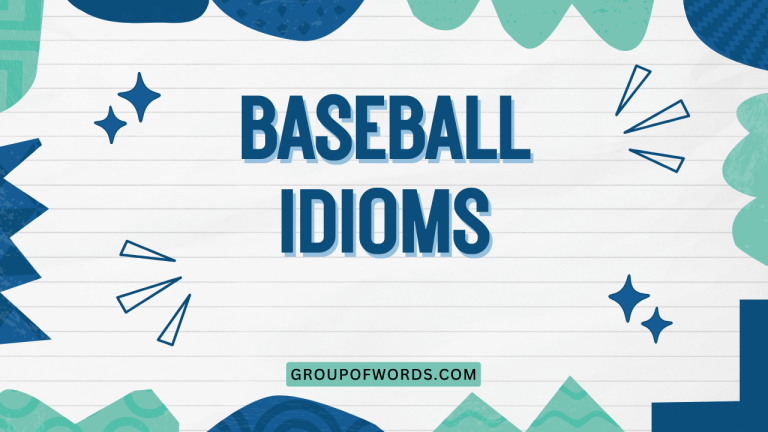Idioms for Perfection: Mastering Flawless English
Understanding idioms is crucial for mastering English, as they add color and depth to communication. Idioms related to “perfection” are particularly useful, allowing you to express the idea of flawlessness in various nuanced ways.
This article explores common idioms that convey the concept of perfection, providing definitions, examples, and practice exercises to help you incorporate them into your everyday language. Whether you’re an English language learner or a native speaker aiming to refine your vocabulary, this guide will equip you with the tools to describe perfection with confidence and flair.
Table of Contents
- Introduction
- Definition of Idioms for Perfection
- Structural Breakdown
- Types and Categories of Idioms for Perfection
- Examples of Idioms for Perfection
- Usage Rules for Idioms of Perfection
- Common Mistakes
- Practice Exercises
- Advanced Topics
- FAQ
- Conclusion
Definition of Idioms for Perfection
Idioms are expressions whose meanings cannot be understood from the literal meanings of the individual words. They are figurative language that relies on shared cultural knowledge to convey a specific meaning.
Idioms for “perfection” are phrases that describe something that is flawless, ideal, or without any faults. These idioms often use imagery and metaphors to paint a vivid picture of something that has been executed to the highest possible standard.
Classification: These idioms typically fall under the category of descriptive idioms, as they describe a state or quality. They often function as adjectives or adverbs within a sentence, modifying nouns or verbs to indicate the level of perfection achieved. Understanding these idioms requires familiarity with their figurative meanings and the contexts in which they are appropriately used.
Function: The function of idioms for perfection is to provide a more colorful and impactful way to express the idea of something being flawless. They add emphasis and nuance to descriptions, making them more engaging and memorable. Instead of simply saying something is “perfect,” using an idiom like “spot on” or “a perfect ten” conveys a stronger sense of accuracy and excellence.
Contexts: These idioms are used in a variety of contexts, from everyday conversations to formal writing. They can be used to describe a wide range of things, including performances, creations, plans, and even people. The specific idiom used will depend on the specific context and the nuance you want to convey. Understanding the appropriate context is key to using these idioms effectively.
Structural Breakdown
The structure of idioms for perfection varies depending on the specific idiom. Some idioms are simple phrases, while others are more complex sentences.
However, they all share the characteristic of having a figurative meaning that differs from the literal meaning of the individual words.
Phrase Structure: Many idioms for perfection are short phrases, often consisting of a few key words that combine to create a specific meaning. For example, “a perfect ten” is a simple phrase that conveys the idea of something being absolutely flawless. Similarly, “spot on” is a short phrase that means perfectly accurate.
Sentence Structure: Some idioms for perfection are structured as complete sentences. For instance, “not a hair out of place” is a sentence that describes someone who is perfectly groomed and composed. The sentence structure adds emphasis and detail to the description of perfection.
Figurative Language: A key element of idioms for perfection is their use of figurative language. They often employ metaphors, similes, and hyperbole to create a vivid and memorable image of something being flawless. For example, “like a well-oiled machine” uses a simile to compare something that functions perfectly to a machine that runs smoothly.
Grammatical Roles: Idioms can function as adjectives, adverbs, or even nouns within a sentence. When used as adjectives, they modify nouns to describe their level of perfection. When used as adverbs, they modify verbs to describe how perfectly something is done. Some idioms can also function as nouns, representing the concept of perfection itself.
Types and Categories of Idioms for Perfection
Idioms for perfection can be categorized based on the specific aspect of perfection they emphasize. Some idioms focus on accuracy, while others focus on completeness or flawlessness.
Here are some common categories:
Accuracy and Precision
These idioms emphasize the idea of something being perfectly accurate or precise.
Completeness and Thoroughness
These idioms highlight the idea of something being complete and thorough, leaving no room for improvement.
Flawlessness and Impeccability
These idioms emphasize the idea of something being flawless and without any imperfections.
Ideal and Optimal
These idioms describe something that is ideal or optimal, representing the best possible outcome.
Skill and Expertise
These idioms focus on the skill and expertise required to achieve perfection.
Examples of Idioms for Perfection
The following tables provide examples of idioms for perfection, categorized by the aspect of perfection they emphasize. Each table includes the idiom, its meaning, and example sentences.
Table 1: Accuracy and Precision
This table provides examples of idioms that describe accuracy and precision.
| Idiom | Meaning | Example Sentence |
|---|---|---|
| Spot on | Exactly correct; perfectly accurate. | Her answer was spot on; she knew the material perfectly. |
| Dead on | Completely accurate. | His prediction was dead on; he nailed it. |
| On the nail | Done or happening at the exact time or moment. | The payment arrived on the nail, as promised. |
| Hit the nail on the head | To describe exactly what is causing a situation or problem. | You’ve hit the nail on the head; that’s exactly what I was thinking. |
| Down to a T | Perfectly; exactly. | The plan was executed down to a T. |
| Right on the money | Exactly right. | His guess was right on the money. |
| On point | Perfectly done or expressed. | Her presentation was on point. |
| To a nicety | With great accuracy and attention to detail. | The cake was decorated to a nicety. |
| Bullseye | A shot that hits the center of the target; perfectly accurate. | He hit the bullseye with his argument. |
| To the letter | Following instructions or rules exactly. | He followed the instructions to the letter. |
| True to life | Accurately representing real life. | The movie was very true to life. |
| As good as it gets | The best possible outcome. | This is as good as it gets in this situation. |
| Picture perfect | Perfect in appearance; flawless. | The scenery was picture perfect. |
| On target | Achieving the desired outcome. | The marketing campaign was on target. |
| In sync | Working perfectly together. | The dancers were perfectly in sync. |
| Sharp as a tack | Very intelligent and quick-witted. | She’s as sharp as a tack when it comes to math. |
| On the button | Exactly right. | His timing was on the button. |
| On the nose | Exactly right or accurate. | The estimate was on the nose. |
| Dead center | Exactly in the middle. | The dart landed dead center. |
| To a fare-thee-well | Completely; perfectly. | The job was done to a fare-thee-well. |
| Without a shadow of a doubt | Certainly; definitely. | I know he’s innocent without a shadow of a doubt. |
| The spitting image | An exact likeness. | She is the spitting image of her mother. |
| Right on cue | At exactly the right moment. | He arrived right on cue. |
Table 2: Completeness and Thoroughness
This table showcases idioms that emphasize completeness and thoroughness.
| Idiom | Meaning | Example Sentence |
|---|---|---|
| Lock, stock, and barrel | Completely; including everything. | They bought the business lock, stock, and barrel. |
| From A to Z | Completely; from beginning to end. | He explained the process from A to Z. |
| Hook, line, and sinker | Completely; without any doubt. | He fell for the scam hook, line, and sinker. |
| The whole nine yards | Everything; the complete amount. | She gave him the whole nine yards about her day. |
| All bases covered | Everything is prepared for; all possibilities are accounted for. | We have all bases covered for the project. |
| All sewn up | Completely settled or arranged. | The deal is all sewn up. |
| The works | Everything available or desirable. | I want the burger with the works. |
| No stone unturned | To try every possible course of action. | We left no stone unturned in our search. |
| Dot the i’s and cross the t’s | To pay great attention to detail. | Make sure you dot the i’s and cross the t’s. |
| In every respect | In every way; completely. | He was successful in every respect. |
| Through and through | Completely; utterly. | He’s a good man through and through. |
| From top to bottom | Completely; thoroughly. | The house was cleaned from top to bottom. |
| To a fault | Excessively; to an extreme degree. | He’s generous to a fault. |
| Inside out | Completely; thoroughly. | She knows the system inside out. |
| Through thick and thin | During good times and bad times. | They stuck together through thick and thin. |
| In all respects | In every way; completely. | The plan was perfect in all respects. |
| All-encompassing | Including everything. | The report was all-encompassing. |
| From head to toe | Completely; all over. | She was covered in mud from head to toe. |
| In its entirety | Completely; wholly. | The document was read in its entirety. |
| Comprehensive | Complete and thorough. | The study was very comprehensive. |
| Every last detail | Including every small part. | He remembered every last detail of the event. |
| From start to finish | From the beginning to the end. | He was involved from start to finish. |
| The full monty | Everything; the complete amount. | He gave us the full monty on the project. |
| All-out | Using all available resources. | It was an all-out effort to finish on time. |
Table 3: Flawlessness and Impeccability
This table offers idioms that portray flawlessness and impeccability.
| Idiom | Meaning | Example Sentence |
|---|---|---|
| A perfect ten | Absolutely perfect; flawless. | Her performance was a perfect ten. |
| Without a flaw | Perfect; without any faults. | The diamond was without a flaw. |
| Impeccable | Perfect; without any mistakes or faults. | His manners were impeccable. |
| In mint condition | In perfect condition; like new. | The antique car was in mint condition. |
| Not a hair out of place | Perfectly groomed and composed. | She always looks like she doesn’t have a hair out of place. |
| Clean as a whistle | Completely clean; without any problems. | The operation was clean as a whistle. |
| Tip-top shape | In excellent condition. | The equipment is in tip-top shape. |
| In apple-pie order | Perfectly neat and tidy. | The house was in apple-pie order. |
| Like new | In very good condition; almost new. | The used car was like new. |
| As pure as the driven snow | Completely innocent or pure. | She’s as pure as the driven snow. |
| Flawless | Without any imperfections. | Her performance was flawless. |
| Unblemished | Without any marks or imperfections. | The skin was unblemished. |
| In perfect nick | In excellent condition. | The old guitar was still in perfect nick. |
| Without a hitch | Without any problems. | The event went off without a hitch. |
| Spick and span | Neat, clean, and well-ordered. | The kitchen was spick and span. |
| As right as rain | Perfectly well or correct. | Everything will be as right as rain. |
| In tip-top condition | In excellent condition. | The machine is in tip-top condition. |
| In fine fettle | In good condition or spirits. | He’s in fine fettle for the race. |
| As fit as a fiddle | In excellent health and condition. | She’s as fit as a fiddle. |
| As sound as a bell | In perfect condition. | The engine is as sound as a bell. |
| In good repair | In good condition. | The bridge is in good repair. |
| Par excellence | Being the best of its kind. | He is a chef par excellence. |
| Beyond reproach | So good that nobody could criticize it. | Her behavior was beyond reproach. |
| Unimpeachable | Beyond doubt or question. | His integrity is unimpeachable. |
Table 4: Ideal and Optimal
This table lists idioms that represent something as ideal and optimal.
| Idiom | Meaning | Example Sentence |
|---|---|---|
| The bee’s knees | Excellent; the best. | This car is the bee’s knees. |
| Cream of the crop | The best of a group. | She’s the cream of the crop in her class. |
| Top-notch | Excellent; of the highest quality. | The service was top-notch. |
| Second to none | The best; unsurpassed. | Their customer service is second to none. |
| World-class | Of the highest standard in the world. | The resort is world-class. |
| The best of the best | The very best. | He’s the best of the best in his field. |
| The cat’s pajamas | Excellent; the best. | This new phone is the cat’s pajamas. |
| A cut above | Better than average. | Her work is a cut above the rest. |
| In a class of its own | Unique and outstanding. | This restaurant is in a class of its own. |
| The ultimate | The best or most extreme of its kind. | This vacation is the ultimate in luxury. |
| Paragon of virtue | A perfect example of a good quality. | She is a paragon of virtue. |
| Optimal | Best or most favorable. | The conditions were optimal for the race. |
| Ideal | Perfect; most suitable. | This is the ideal location for the new store. |
| In the pink | In good health or condition. | She’s in the pink after her vacation. |
| Top of the line | The best quality available. | This is a top of the line product. |
| The last word | The best or most advanced. | This car is the last word in technology. |
| The epitome of | A perfect example of. | She is the epitome of elegance. |
| The gold standard | The best or most reliable example. | This is the gold standard for customer service. |
| The ne plus ultra | The highest point or degree of excellence. | This resort is the ne plus ultra of luxury. |
| Beyond compare | Better than anything else. | Her beauty is beyond compare. |
| Unrivaled | Having no equal. | His skill is unrivaled. |
| Matchless | Unequaled; incomparable. | Her talent is matchless. |
| Peerless | Unequaled; without peer. | His dedication is peerless. |
| Unsurpassed | Better than any other. | The view is unsurpassed. |
Table 5: Skill and Expertise
This table provides examples of idioms related to skill and expertise.
| Idiom | Meaning | Example Sentence |
|---|---|---|
| Know something inside out | To know something very well. | She knows this system inside out. |
| Have something down to a science | To be able to do something perfectly because you have done it so many times. | He has cooking the perfect steak down to a science. |
| Master of the craft | Someone who is highly skilled in a particular activity or profession. | He is a master of the craft when it comes to woodworking. |
| At the top of one’s game | Performing at one’s best. | She is at the top of her game right now. |
| A dab hand at | Very skillful at something. | He’s a dab hand at fixing cars. |
| A whiz | A person who is very good at something. | She’s a whiz at mathematics. |
| A natural | Having an innate ability or talent for something. | He’s a natural at playing the piano. |
| Made to measure | Perfectly suited or designed. | The suit was made to measure for him. |
| Tried and tested | Proven to be effective or reliable. | This method is tried and tested. |
| Seasoned professional | An experienced and skilled person in a particular field. | He is a seasoned professional in the industry. |
| Been there, done that | Having experienced something already. | I’ve been there, done that, so I know what to expect. |
| Know the ropes | To understand the details of how something is done. | She knows the ropes of the business. |
| Adept at | Very skilled or proficient at something. | He is very adept at problem-solving. |
| A virtuoso | A person highly skilled in music or another artistic pursuit. | She is a virtuoso on the violin. |
| A maestro | A distinguished musician, especially a conductor. | He is a maestro of classical music. |
| A maven | An expert or connoisseur. | She is a fashion maven. |
| A guru | An expert in a particular field. | He is a technology guru. |
| A pro | A professional; someone skilled at something. | He’s a pro at photography. |
| A dab hand | Skilled at something. | She’s a dab hand at cooking. |
| A past master | Someone very skilled at something. | He’s a past master at negotiation. |
| A veteran | Someone with a lot of experience in a particular field. | He’s a veteran journalist. |
| A wizard | Someone who is very skilled at something. | She’s a computer wizard. |
| A genius | Someone with exceptional intellectual or creative power. | He’s a mathematical genius. |
| A prodigy | A person with exceptional qualities or abilities. | She’s a musical prodigy. |
Usage Rules for Idioms of Perfection
Using idioms correctly requires understanding their specific meanings and the contexts in which they are appropriate. Here are some general rules for using idioms of perfection:
Context: Choose idioms that are appropriate for the specific context. Some idioms are more formal than others, and some are more suitable for specific situations. For example, “a perfect ten” is often used in informal settings to describe something that is visually appealing, while “impeccable” is more formal and can be used in a wider range of contexts.
Audience: Consider your audience when using idioms. If you are speaking to someone who is not a native English speaker, it is best to avoid using idioms altogether, or to explain their meaning clearly. Even among native speakers, some idioms may be unfamiliar to certain groups, so it is important to be mindful of your audience’s background.
Overuse: Avoid overusing idioms, as this can make your language sound unnatural and forced. Use them sparingly and only when they add value to your communication. A well-placed idiom can enhance your message, but too many idioms can detract from it.
Misinterpretation: Be aware that idioms can be misinterpreted, especially by non-native speakers. If you are unsure whether your audience will understand an idiom, it is best to use a more straightforward expression. Clarity is always more important than using colorful language.
Grammatical Structure: Ensure that the idiom fits grammatically within the sentence. Pay attention to the correct tense, verb agreement, and word order. Using an idiom incorrectly can lead to confusion and miscommunication.
Common Mistakes
Here are some common mistakes to avoid when using idioms of perfection:
Literal Interpretation: Interpreting idioms literally is a common mistake, especially for non-native speakers. Remember that idioms have figurative meanings that differ from the literal meanings of the individual words.
Incorrect Usage: Using idioms in the wrong context or with the wrong meaning is another common mistake. Always double-check the meaning of an idiom before using it to ensure that it is appropriate for the situation.
Overuse of Idioms: Overusing idioms can make your language sound unnatural and forced. Use them sparingly and only when they add value to your communication.
Misunderstanding Cultural Nuances: Some idioms have cultural nuances that may not be obvious to everyone. Be aware of these nuances and use idioms in a way that is respectful and appropriate.
Mixing Idioms: Avoid mixing idioms, as this can create nonsensical and confusing expressions. Each idiom has its own specific meaning and structure, and combining them can lead to unintended results.
Here are some examples of Incorrect vs. Correct usage:
| Incorrect | Correct | Explanation |
|---|---|---|
| He hit the head on the nail. | He hit the nail on the head. | The correct idiom is “hit the nail on the head,” not “hit the head on the nail.” |
| She knows the system inside out and back. | She knows the system inside out. | The correct idiom is “know something inside out,” not “inside out and back.” |
| We left every stone unturned. | We left no stone unturned. | The correct idiom is “leave no stone unturned,” not “leave every stone unturned.” |
| It was the knees of the bee. | It was the bee’s knees. | The correct idiom is “the bee’s knees,” not “the knees of the bee.” |
Practice Exercises
Test your understanding of idioms for perfection with these practice exercises.
Exercise 1: Fill in the Blanks
Fill in the blanks with the appropriate idiom from the list below.
(spot on, lock stock and barrel, a perfect ten, without a flaw, all bases covered)
| Question | Answer |
|---|---|
| 1. Her performance was __________. She was amazing. | a perfect ten |
| 2. His answer was __________. He knew the subject well. | spot on |
| 3. They bought the company __________. | lock stock and barrel |
| 4. The plan was __________. We had thought of everything. | all bases covered |
| 5. The diamond was __________. It was beautiful. | without a flaw |
| 6. Her impression of him was __________. | spot on |
| 7. We are selling the house __________. | lock stock and barrel |
| 8. His presentation was __________. | a perfect ten |
| 9. We have __________ for the event. | all bases covered |
| 10. The painting was __________. | without a flaw |
Exercise 2: Multiple Choice
Choose the correct meaning of the idiom in the sentence.
| Question | Options | Answer |
|---|---|---|
| 1. He hit the nail on the head with his analysis. | a) Was wrong b) Was exactly right c) Was close but not quite | b) Was exactly right |
| 2. The plan was executed down to a T. | a) Perfectly b) Poorly c) Roughly | a) Perfectly |
| 3. The equipment is in tip-top shape. | a) Bad condition b) Excellent condition c) Average condition | b) Excellent condition |
| 4. She’s the cream of the crop. | a) The worst b) The best c) Average | b) The best |
| 5. She knows the system inside out. | a) Knows it vaguely b) Doesn’t know it c) Knows it very well | c) Knows it very well |
| 6. He is a dab hand at fixing cars. | a) Unskilled b) Skilled c) Average | b) Skilled |
| 7. The deal is all sewn up. | a) Not settled b) Completely settled c) Partially settled | b) Completely settled |
| 8. She is as fit as a fiddle. | a) Unhealthy b) Very healthy c) Average health | b) Very healthy |
| 9. His integrity is unimpeachable. | a) Questionable b) Beyond doubt c) Somewhat doubtful | b) Beyond doubt |
| 10. He’s at the top of his game right now. | a) Performing poorly b) Performing at his best c) Performing averagely | b) Performing at his best |
Exercise 3: Sentence Completion
Complete the sentences using the idioms provided in the box below. Each idiom should be used only once.
(as right as rain, on the button, in apple-pie order, second to none, from A to Z, without a hitch, cream of the crop, know the ropes, inside out, lock, stock, and barrel)
| Question | Answer | |
|---|---|---|
| 1. After a good night’s sleep, I’ll be __________. | as right as rain | |
| 2. The timing of the event was __________. | on the button | |
| 3. Her house is always __________. | in apple-pie order | |
| 4. Their customer service is __________. | second to none | |
| 5. He explained the process __________. | from A to Z | |
| 6. The event went __________. | without a hitch | |
| 7. She is the __________ of her class. | cream of the crop | |
| 8. He __________ of the business. | know the ropes | |
| 9. She knows the system __________. | inside out | |
| 10. They sold the business __________. | lock, stock, and barrel |
Advanced Topics
For those looking to delve deeper into the study of idioms for perfection, here are some advanced topics to explore:
Historical Origins: Research the historical origins of specific idioms. Understanding the etymology and cultural context of an idiom can provide valuable insights into its meaning and usage.
Regional Variations: Investigate regional variations in the use of idioms. Some idioms may be more common in certain parts of the world than others, and their meanings may vary slightly from region to region.
Idioms in Literature: Analyze the use of idioms in literature. Pay attention to how authors use idioms to create vivid imagery, develop characters, and convey themes.
Idioms in Different Languages: Compare idioms for perfection in English with those in other languages. This can reveal interesting cultural differences and similarities in how different cultures perceive and express the concept of perfection.
Creating Your Own Idioms: Experiment with creating your own idioms for perfection. This can be a fun and creative way to deepen your understanding of figurative language and expand your expressive abilities.
FAQ
Frequently Asked Questions About Idioms for Perfection
Why is it important to learn idioms for perfection?
Learning idioms for perfection enhances your ability to express nuanced meanings and adds color to your language. It helps you sound more natural and fluent in English.
How can I effectively learn and remember idioms?
Use flashcards, practice idioms in context, and try to incorporate them into your daily conversations. Regular exposure and active usage are key.
Are there any idioms for perfection that should be avoided?
Some idioms may be outdated or culturally insensitive. It’s important to be aware of the context and audience when using idioms.
Can idioms for perfection be used in formal writing?
While some idioms are suitable for formal writing, others are more appropriate for informal contexts. Choose idioms that align with the tone and style of your writing.
How do I avoid misusing idioms?
Always double-check the meaning and usage of an idiom before using it. Pay attention to the context and ensure that the idiom fits grammatically within the sentence.
Conclusion
Mastering idioms for perfection is a valuable skill for anyone looking to improve their English language proficiency. By understanding the meanings, usage rules, and common mistakes associated with these idioms, you can effectively incorporate them into your everyday language and enhance your communication skills.
Keep practicing, exploring, and refining your knowledge of idioms, and you’ll be well on your way to expressing perfection with confidence and flair. Remember to consider context, audience, and cultural nuances when using idioms, and always strive for clarity and accuracy in your communication.






